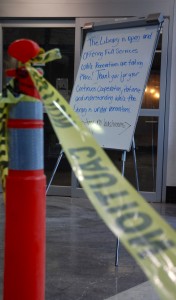Video: Casey Printers engages Kwantlen on leadership
September 29, 2010 by Brittany Tiplady · 2 Comments
Casey Printers, BC Lions quarterback and an entrepreneur, gave a speech for 20 people on leadership at Kwantlen Surrey Campus on Wednesday, Sept. 22.
Kwantlen Department of Student Leadership & Development and Athletics co-sponsored the event, as part of Kwantlen’s Give Back Week. Printers give an engaging talk about the qualities needed to become a successful leader in school, business, sports and life.
Podcast: Kwantlen team participates in the AIDS Walk for Life
September 29, 2010 by Brian Russell · Leave a Comment
[audio:first_podcast.mp3]
Kwantlen staff and students took part as a team in the AIDS Walk for Life in Vancouver on Sept. 19. Talysa Dhahan and Brian Russell share interviews from and discuss the walk, and also look at upcoming events students might enjoy.
Students finding ways to save on textbook costs
September 27, 2010 by Meagan Gill · 1 Comment
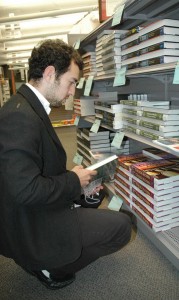
Mohamed El-alem shopping for textbooks at the Kwantlen Polytechnic University bookstore in Richmond on Sept. 24. (Photo by Meagan Gill)
It’s no secret that textbooks can be expensive, coming on top of tuition and living expenses. For a student relying on a part-time job to cover these costs, having a social life is pretty much out of the question.
“Textbooks are extremely expensive, I just paid $512 on textbooks for this semester,” said Kayla Shimbashi.
Fortunately, there are some ways students can save a little extra money. If students buy used textbooks through the bookstore, BC bookworm or Craigslist, it’ll keep more cash in their wallets.
“If I had bought my textbooks from the bookstore, it would have cost me about $300. But since I got them used off of Craigslist, I only paid like $170 for them,” said Scott Rachel.
Out of 20 Kwantlen students interviewed, only five bought their textbooks used. The majority of the students who bought new textbooks new from the bookstore were first-year students. The students who bought their textbooks used off of Craigslist and BC Bookworm were second- and third-year students.
Craigslist is one of the most popular sites for buying and selling used textbooks. You can find textbooks for the majority of your courses being sold up to 50 per cent cheaper and most are in great condition.
“I buy my textbooks from the bookstore because it’s just really convenient. When I’m done with them, I usually post them up on Craigslist. I’ve sold four out of eight of my old textbooks on Craigslist,” said Jansen Paulino.
BC Bookworm is an organization run by students that allows you to buy and sell used textbooks. It’s free to post an ad and the ad stays up for 90 days. The site states it can help students save up to 35 per cent on their textbooks.
“I find BC Bookworm really helpful, I used it to buy a few of my textbooks last semester,” said Fei Hyang.
Another way to save some money on textbooks is to borrow from friends or split the cost of textbooks with classmates.
“I either buy my textbooks at the bookstore or I borrow them from friends who have taken that course,” said Samantha Sunderland.
Skytrain station names: ‘The next station could be Kwantlen’
September 27, 2010 by Paul Fleischanderl · 4 Comments
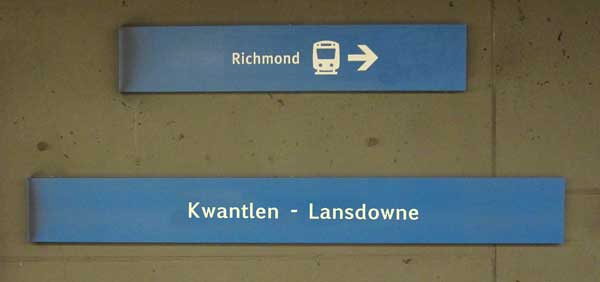
Have you ever wondered why Langara College is mentioned as a Canada Line station name (Langara – 49th Ave), but Kwantlen isn’t?
At the Communication & Marketing Department of Langara there were no answers. “There was no communication between Translink and Langara. You should ask Translink.”
Ken Hardie, Translink’s director of communications, said that the process of naming the stations involved much discussion. Normally stations are named in a way to orientate people and help them to locate what is nearby. “In the case of Langara, the university is a key destination at this station and therefor mentioned,” he said.
Joanne Saunders, Kwantlen’s Director of Marketing and Communication, wasn’t working at Kwantlen at the time stations were named, but she was told that there was some discussion about the Lansdowne station being named Kwantlen.
“Langara is very lucky to get the free publicity and advertising from the skytrain name,” she said.
But — as both Hardie and Saunders said — the final decision rests with Translink and the latter perceived Kwantlen not to be close enough to warrant inclusion in the station name. “The university isn’t associated with Lansdowne as Langara is with 49th Avenue,” Hardie said.
A little comparison on Google Maps shows that from Langara station to the main entrance of the college it takes six minutes by foot. From Lansdowne to Kwantlen it is eight minutes. Also, both Langara and Kwantlen serve approximately 20,000 students.
But there is hope Hardie said. “If folks from Kwantlen want the university to be mentioned at Lansdowne station we could talk about this.”
What do Kwantlen students (and also residents of Lansdowne) think?
Voting: Should the Lansdowne station be re-named “Kwantlen – Lansdowne”?
A: Yes, definitely!
B: No, I think this is not necessary.
C: I couldn’t care less!
(Leave your answers into the comments)
Security officers on campus put students at ease
September 27, 2010 by Sarah Casimong · Leave a Comment
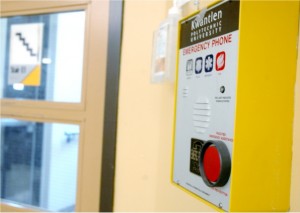
In case of emergency, speaker phones are located on the Surrey, Richmond and Langley campuses. The two-way speaker phone is answered by security personnel and faculties. (Photo by Sarah Casimong)
Most students, occupied by the stress of classes, barely have time to think about the safety of their environment at the school. It might take a rare incident before students look into what is provided for them by faculties and what they should do if a threat should occur.
Of those asked whether they feel safe at Kwantlen, most students said yes. Many acknowledged the presence of security officers as the main reason for their ease.
According to the school website, there are security officers on all four campuses. With the exception of Cloverdale, all campuses have emergency speaker phones students can use to call security personnel.
Jayson Bulahan, 19, who is studying criminology at the Surrey and Richmond campuses, has been attending Kwantlen for two years and feels free from harm.
“I’m aware that there are security guards [around] the campus area,” said Bulahan. “So far, there hasn’t been any issues within campus that has ever made me feel unsafe.”
Chiny Babilonia, 21, taking criminology, had similiar views. “I do feel somewhat safe at night,” said Babilonia. “I used to take night classes at the Surrey campus and after class I don’t feel any danger or harm. Whenever I would walk in the parking lot to go to my car, [knowing that there are] security guards walking around campus when it’s near closing time, [helps me feel] safe.”
Some students credited the school’s size as a safety factor.
“I feel at ease at school, whether it be night or day,” said Michael Viloria, 20, taking history at both Surrey and Richmond. “I think the school is easy-going, although, the threats may come from the outside. Even so, the school isn’t as big as other universities, so finding help in the security office doesn’t require much effort.”
However, not all students feel safe. Michelle Mariano, 27, a psychiatric nursing student, is afraid to walk alone at night.
“I don’t see any security around,” said Mariano. “Last semester I had a late class. It’s scary if I have to walk by myself.”
For more information on security, visit the security section of the school site.
Video: Kwantlen students paying more to park
September 25, 2010 by Josh Saggau · 1 Comment
Translink’s parking tax increase has raised the price students have to pay to park at Kwantlen campuses. Josh Saggau and Hayley Woodin explain what it means for students and talk to students to see how it’s affecting them.
Extreme Makeover: Kwantlen library edition
September 25, 2010 by Jocelyn Gollner · Leave a Comment
The library at the Kwantlen Richmond campus is getting an overhaul, undergoing a $1.2-million reconstruction project, partially funded by the Knowledge Infrastructure Project (KIP).
(KIP is part of Canada’s Economic Action Plan, and will spend $2 billion over two years to repair and expand colleges and universities across the country. In B.C., KIP is spending more than $230 million on 44 post-secondary institutions.)
Some of the improvements to the Kwantlen Richmond library will include more computer stations, more seating, more study rooms, a new copy room and a new information desk.
“I just think it will be an amazing transformation,” said Cathy MacDonald, the University librarian. “It will just be much more updated.”
The library at the Kwantlen Richmond campus is one of three projects at Kwantlen Polytechnic University partially funded by KIP. The other two projects are various student services renovations at the Langley campus and a partial building replacement at the Surrey campus.
The Kwantlen Richmond library is still open during renovations, but if you are looking for a quiet place to study, don’t go in the morning.
“[The contractors] are going to try to do much of the noisy drilling before 8 a.m.,” MacDonald said.
As well, the washrooms are not available for use in the library.
The renovation project is expected to be finished before the end of December.
“We had a report today that they are right on schedule,” MacDonald said.
More details about the library reconstruction are available at the college website.
Note: This article was updated, with quotes from Cathy MacDonald, on Sept. 30, 2010.
September 25, 2010 by Jeffrey Yip · Leave a Comment An interview with Susan Davidson, vice chair of the Langley Community Farmers Market board of directors, about the farmers market and their partnership with Kwantlen’s Langley campus. For more information visit the Langley Community Farmers Market website. Video by Jeffrey Yip and Matt Law. September 25, 2010 by Jeffrey Yip · Leave a Comment Dr. Deborah Henderson showing how trichogramma sibericum, a tiny parasitic wasp, is produced at the Institute for Sustainable Horticulture's research lab. The wasp is used to help control fireworms, an insect pest that attacks cranberries. (Photo by Jeffrey Yip) While it still hasn’t put its sign up, the Institute for Sustainable Horticulture lab, or ISH lab, is now up and running. “I’m glad you came a year after opening … because when it opened we had an empty lab,” Dr. Deborah Henderson said. Henderson has a PhD in entomology from UBC and a post doctorate in medical entomology from the University of Toronto. Before coming to Kwantlen, she had her own company, ES Crop Consulting Limited, a consulting company in agriculture that provided integrated pest management, monitoring services for farmers, and research and field trials in biological control products. “It took far longer than I had ever thought to get it up and moving. But, we’re pretty functional now.” While the ISH lab isn’t a teaching facility, its research project are very much integrated with Kwantlen’s School of Horticulture and the Environmental Protection Technology (EPT) program. And one of the most important collaborations that the ISH lab has with the two programs is a project in Cuba. Six students headed for Cuban farms “There’s a food security project in Cuba and a number of field research trials going on there,” Henderson said. “So, we have six student going to Cuba at the end of October to spend three months working on bio control field trials on a cooperative farm. Two of them are EPT students and four of them are horticulture students.” Henderson hopes to continue this project over the next three years. “[W]e want to make it a regular program with Cuba, and integrate it into the new degrees that are in the School of Horticulture. So there could very well be in the future, a course that’s offered in Cuba in the winter term. The students would go down and take that course in Cuba and get credit here,” Henderson said. According to Henderson, Cuba is the world leader in the use of biological controls, that is using fungi, viruses and other insects to control crop damaging insects. When the Soviet Union collapsed in the early 1990s Cuba lost nearly 90 per cent of its imports, including food and petroleum products. As the country began to starve, the government enlisted the country’s farmers to find a solution to the food shortages. There answer was to turn much of the available space in the cities into organic vegetable gardens. Because the gardens were in the cities, the food was organically grown, with no chemical pesticides. Instead they used bio controls. “They’re still using chemicals for some production out in the country,” Henderson said. “So, the project that we’re working on is the conversion of large cooperative farms to ecological methods. And the students are going to be involved in that. [W]e have a 600-hectare farm that has agreed to convert to these ecological methods.” Working closer to home
Closer to home, the ISH lab is also conducting research with biological controls. The biological controls the ISH lab works on are a naturally occurring part of the ecosystem. The lab isolates them, makes more of them and tests them to see how effective they are in controlling insects that damage food crops. But, unlike other labs, Henderson wants their research to go one step further and take successful bio control products all the way to commercialization. “We’ve got to get products in the hands of growers or else our research isn’t benefiting the people that need the research done,” Henderson said. A major part of the lab’s work with bio controls has to do with horticultural sustainability. For the ISH lab, achieving sustainability will also focus on how climate change will affect food production, and looking into new production systems that are closer to market will reduce the use of fossil fuels to bring products from far away. “We are very unsustainable as a species. We have to become sustainable. So any time we can replace unsustainable practices we’re a step towards that goal. And so my particular expertise and experience is doing exactly that,” Henderson said. “[W]e are going to have to face the reality of climate change. We have a responsibility to take care of our own food security. How can we help anybody else when we can’t feed of ourselves. And right now we don’t feed of ourselves.” British Columbians ‘want sustainable food production’ According to Henderson, only four per cent of B.C.’s land is arable, that is land that can be used for growing crops. But, Henderson believes British Columbians are sensitive to food security issues and want food production to be sustainable. “I think we are in great shape. [W]e grow close to 250 crops in B.C. already. So, in that sense we have a pretty big advantage over the Prairies for instance,” Henderson said. “Quite honestly I think there’s a big social benefit to growing your own food close to home and knowing where your food comes from … and not being so divorced from it that you think it comes from a grocery store.” As part of being sustainable, the lab itself is doing its part. “It’s a beautiful facility. It’s been made to be as energy efficient as possible. We’ve applied for LEED certification on it, that’s a designation for environmentally friendly buildings,” Henderson said. The lab has two sides: microbiology, where they do the research on fungi, and entomology, where they do research with insects and insect viruses. The lab also has production facilities for making fungi and rearing predator and parasitoid insects. Overall, Henderson seems pleased with the progress the lab has made over the past year, especially in its collaboration with Kwantlen’s horticulture and EPT programs. “The kind of things we do now with students, I’ve written internships into all of our research proposals,” said Henderson. “So many of our programs are applied focused … so our research is [also] applied focused. And they enhance each other.” “We’ve got a little turf project where we’re going to look at compost on turf and so I’m going to communicate with the turf instructors to say, ‘Would you like to get your students involved? Here’s what I have in mind. Do you have any better ideas?’ And we’ll do it with them so that students can be involved.” September 21, 2010 by Stu Gallacher · Leave a Comment A new bylaw went into effect on Sept. 1, prohibiting smokers from lighting up in public parks and on beaches in Vancouver — excluding Wreck Beach, of course. In a string of initiatives to deter smoking, the new ban is just another drop in the bucket. The bucket, however, is getting pretty full. How long will it be until the right to smoke a cigarette in Vancouver is abolished? Then again, if the impact of smoking in Vancouver is so harsh and uncompromising, perhaps there’s a greater issue at stake. Why not just make it illegal? Smoking does appear to be falling into a category of socially unacceptable behaviour, akin to shooting heroin and smoking meth. These days, the satisfaction from inhaling a cigarette in public is rivaled by the ethical judgments of a preeminent non-smoking community. Besides, how long would it really take for devout smokers, and casual smokers alike, to kick the habit if cigarettes were taken off the market? There’s no shortage of healthy alternatives readily available to fill the void: yoga, swimming, coffee, breathing fresh air. The list goes on. Sadly, they don’t possess all the toxic qualities cigarettes do, and are therefore significantly less attractive pastimes. But why not give it a shot? Indeed, cigarettes have been around for eons. But change is inevitable. So rather than looking at the new bylaw as a retraction of some inherent spiritual liberty, let’s consider the possibility that the concerned, health-conscious and politically active are genuinely trying to save us from ourselves, one step at a time. • • • Here’s what a few students on the Richmond campus had to say about the issue: Marianna Vilchinsky “I think it’s good. If you don’t smoke, I don’t think you should be surrounded by it. But I don’t think it should be banned because it’s still your personal choice.” Cassidy Scott “It’s not even politically correct to smoke.” Kimiya Shokoohi “As a social smoker, I feel like we smoke when we’re having a good time, when we’re out at beaches, when we’re out at parks and together there. So it kind of takes away that activity. It does take away people’s right to smoke, as a smoker and as an individual. Who is anyone to tell me what I can and can’t do?” Megan Mcnee “I think it’s getting to the point where it could be illegal, in the next decade or so. I wouldn’t say smoking is irreplaceable, but it’s better than doing hard drugs. I suppose you could get physically active, but I prefer smoking.” Veronica Fraczyk “I don’t think it’s going to do much. People are going to smoke if they want to. It’s a very serious addiction, and I think they’ll find a way to get around it. I would absolutely vote to get [smoking] off the market.”Langley’s farmers market at Kwantlen continues to grow
Kwantlen’s ISH lab finds a second home in Cuba
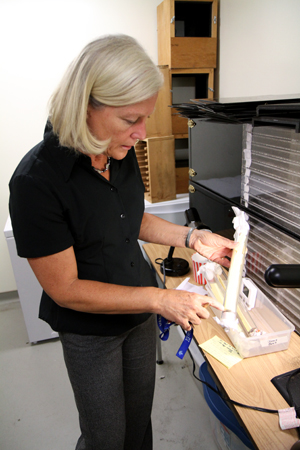
Smoke up, life’s short?
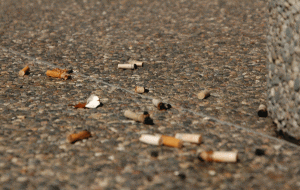
Age: 19
Program: General studies
Smoker: Yes
Age: 18
Program: Journalism
Smoker: No
Age: 20
Program: Journalism
Smoker: Casual
Age: 20
Program: Interior design
Smoker: Yes
Age: 26
Program: Accounting
Smoker: No

